The 9th China Tax Lawyers, Tax Agents and Tax Law Graduate Students Summer Academy(2024)
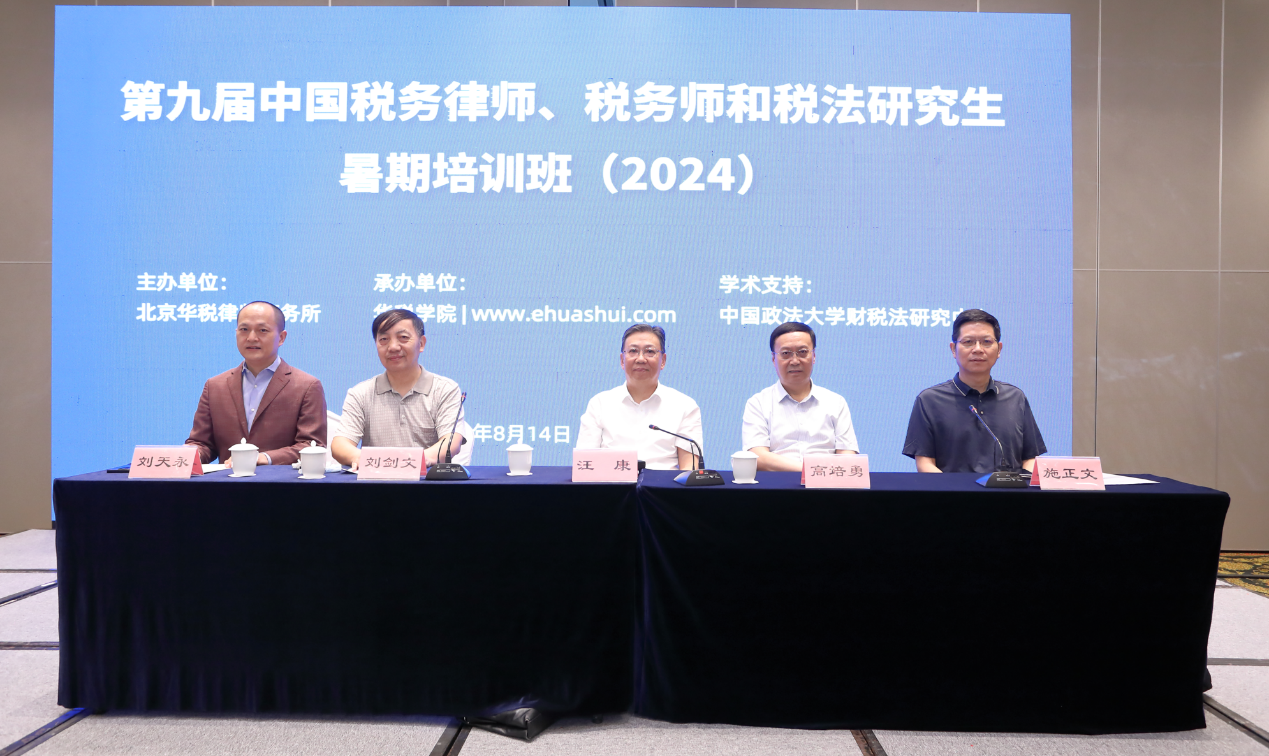
Pictured: Opening Ceremony
August 14-18, 2024, “The 9th China Tax Lawyers, Tax Agents and Tax Law Graduate Students Summer Academy(2024)” cum “The Special Training Course on Judicial Interpretations Related to Tax by the Supreme Court and Procuratorate” were held in Beijing. The event was organized by Hwuason Law Firm, implemented by Huashui Academy, and received academic support from the Center for Fiscal and Tax Law Research at the China University of Political Science and Law. After opening registration nationwide, the summer academy received enthusiastic responses from various provincial bar associations, tax associations, law firms, tax advisory firms, lawyers, tax advisors, university law faculties, tax law graduate students, corporate tax managers, and tax officials. By the application deadline of July 31, the organizing committee received applications from over 400 individuals across nearly 30 provinces and cities. A review panel was established, and based on principles of fair competition, merit selection, comprehensive balance, and diversity of participants, 196 students were ultimately admitted.
This year’s summer training program was held against the backdrop of studying and implementing the spirit of the Third Plenary Session of the 20th Central Committee of the Communist Party of China, focusing on new developments and changes in tax rule of law and tax administration reforms, and serving the high-quality development of China’s modernization and tax rule of law. On the morning of August 14 at 8:30 AM, an opening ceremony was held for the summer academy. Mr. Liu Tianyong, Director of the Taxation Law Professional Committee of the All-China Lawyers Association and Managing Partner of Hwuason Law Firm, served as the host of the opening ceremony. Attending the opening ceremony were Mr. Wang Kang, former Deputy Director of the State Administration of Taxation and First Vice President of the China Tax Society; Professor Liu Jianwen, President of the Chinese Society of Fiscal and Tax Law and Professor at the School of Law, Peking University; Professor Gao Peiyong, Academician of the Chinese Academy of Social Sciences (CASS), former Deputy President of CASS, and President of the Institute of Finance and Strategic Studies, CASS; and Professor Shi Zhengwen, Vice President of the Chinese Society of Fiscal and Tax Law and Director of the Center for Fiscal and Tax Law Research at the China University of Political Science and Law.
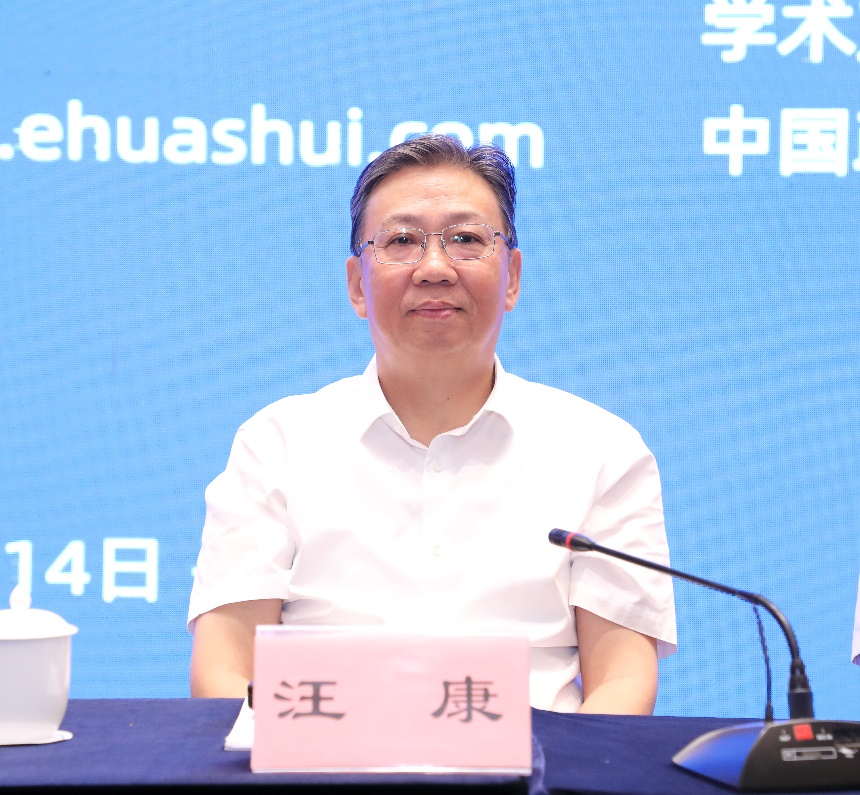
Pictured: Vice President Wang Kang
In his speech, Vice President Wang Kang first extended his congratulations on the organization of "The 9th China Tax Lawyers, Tax Agents, and Tax Law Graduate Students Summer Academy (2024)" cum "The Special Training Course on Judicial Interpretations Related to Tax by the Supreme Court and Procuratorate." He emphasized that tax professionals should implement "The spirit of the Third Plenary Session of the 20th Central Committee," actively engage in the new round of fiscal and tax system reform, serve the modernization of China's tax governance, and strive for even greater achievements! Finally, he wished The 9th Summer Academy a successful run.
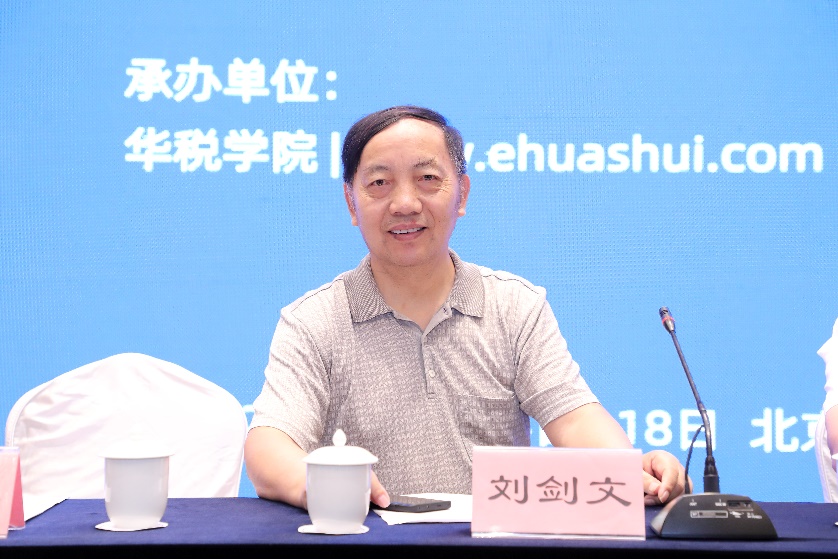
Pictured: President Liu Jianwen
In his speech, President Liu Jianwen first praised the Summer Academy for its long-standing commitment to cultivating tax lawyers, tax agents, and tax law graduate students through its public-spirited efforts. He noted that this is a season of harvest for tax law, with developments such as the removal of administrative review and litigation as preconditions for tax payment in Article 66 of the Customs Duty Law, and the issuance of judicial interpretations on crimes that jeopardize tax administration by the Supreme People's Court and the Supreme People's Procuratorate. He pointed out that the demand for tax legal services and high-level tax law professionals is continuously growing. Drawing on the significant proposition put forth by the Third Plenary Session of the 20th Central Committee to "fully implement the principle of tax legality," President Liu conducted an in-depth theoretical analysis and interpretation from multiple perspectives, including the relationship between the form and substance of the principle of tax legality, the holistic construction of fully implementing the principle of tax legality, and the relationship between the principle of tax legality and coordinated development. Finally, he expressed his best wishes for the success of The 9th Summer Academy.
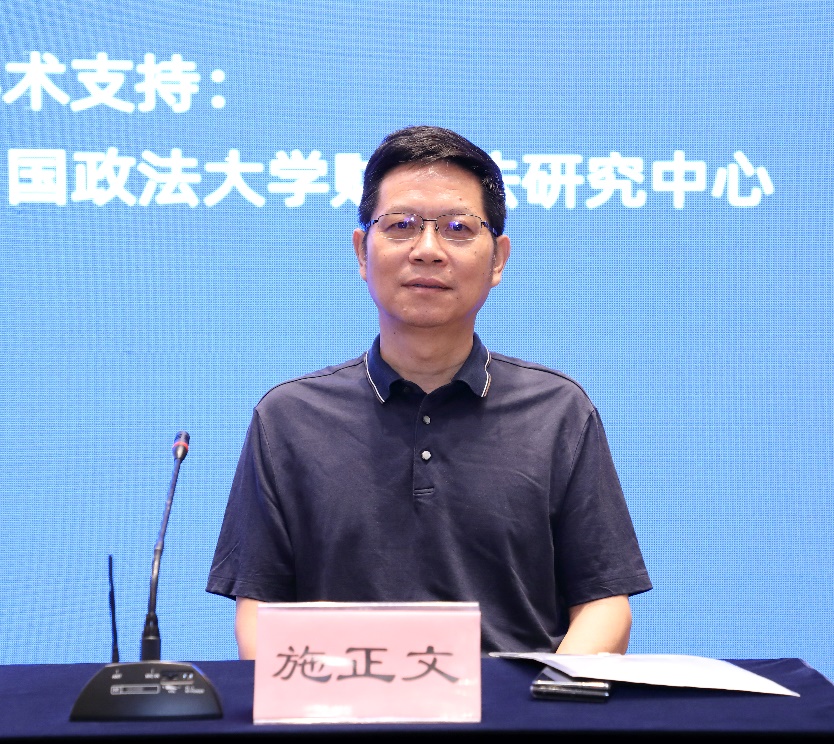
Pictured: Director Shi Zhengwen
In his speech, Director Shi Zhengwen, in reference to the current round of fiscal and taxation reform, pointed out that tax law services will inevitably face many new challenges for a long time to come. These challenges include reforms to value-added tax (VAT), consumption tax, and local taxes, as well as the emergence of new business models. He noted that these reforms pose new challenges to the capabilities of tax professionals and the regulatory abilities of government agencies. Facing these new circumstances, the saying "If one does not renew oneself daily, one will surely regress daily" is particularly relevant. He encouraged all participants to work hard in their studies and become tax law experts who are both morally upright and legally knowledgeable. Finally, he wished all the participants a wonderful and unforgettable experience during their five days of study.
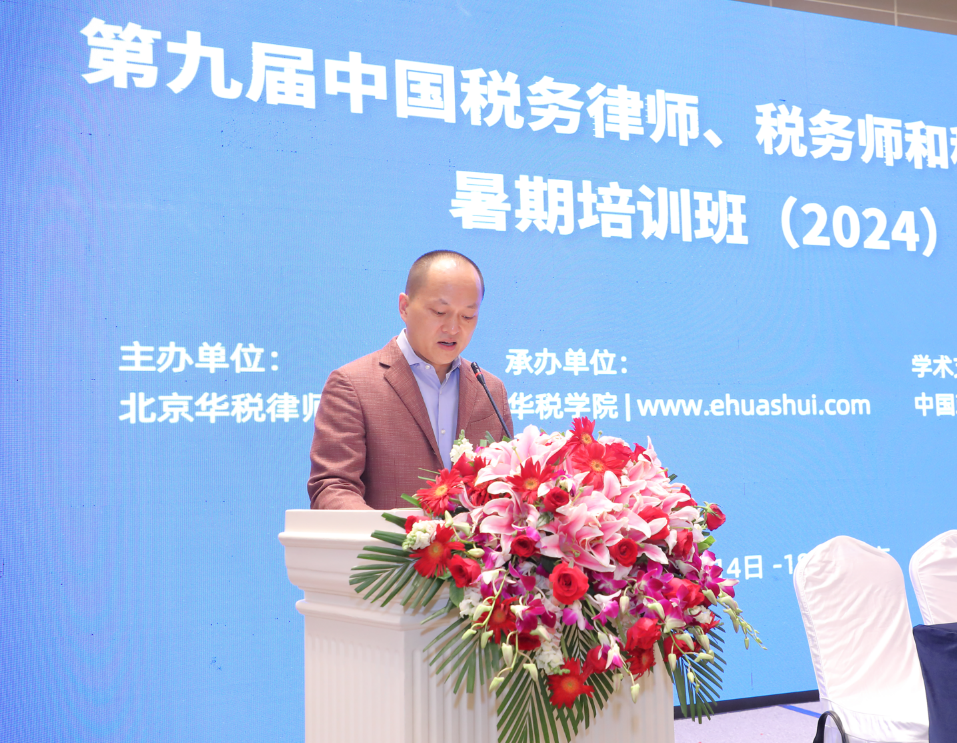
Pictured: Director Liu Tianyong
In his concluding speech as the host, Director Liu Tianyong thanked the three distinguished leaders and experts for their inspiring speeches and congratulated the admitted students. He introduced the course structure of this Summer Academy and wished everyone success in broadening their horizons, enhancing their skills, and making new friends over the next five days.
During the five-day program, leading experts from courts, tax authorities, and customs, as well as renowned professors from prestigious universities and seasoned professionals from top-tier domestic and international law firms, accounting firms, and tax advisory firms, provided in-depth analysis and interpretation on hot topics in tax services. These topics included the widely discussed “Two Supreme” judicial interpretations, VAT legislation, customs duties legislation, revisions to the Tax Collection and Administration Law, tax audits, resolution of tax disputes, disputes over export tax rebates, international tax services, cross-border investment, and tax planning for high-net-worth individuals, covering both theoretical and practical aspects.
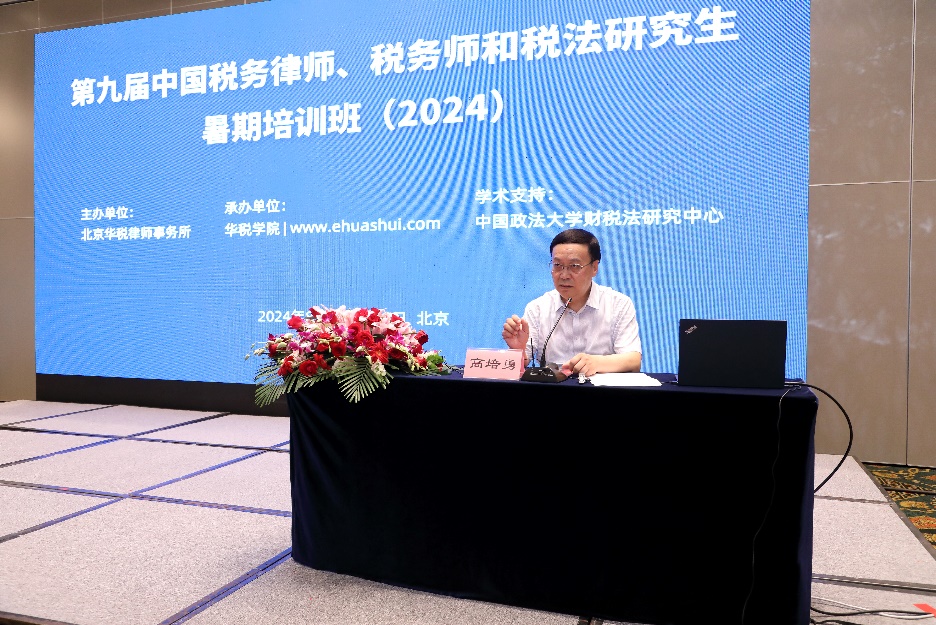
Pictured: Professor Gao Peiyong gives lectures
From 9: 00 a.m. to 10: 30 a.m. on August 14, Professor Gao Peiyong, a member of the faculty of the Chinese Academy of Social Sciences, former vice-president of the China Academy of Social Sciences and president of national academy of economic strategy, gave a special lecture on the theme "Interpretation of the Third Plenary Session of the 20th Central Committee on the New Round of Reform of the Fiscal and Tax System". The lecture revolved around the part on the reform of the fiscal and taxation system in the Third Plenary Session of the 20th Central Committee, pointing out that the new round of reform of the fiscal and taxation system is an important part of further deepening the reform in an all-round way, and comprehensively explaining the status and relationship of the reform of the fiscal and taxation system. First of all, to learn and understand the important deployment of the third plenary session of the twentieth central Committee to the new round of reform of the fiscal and taxation system, we must combine the reform spirit of the third plenary session of the eighteenth central Committee of the party and the course of the previous round of reform of the fiscal and taxation system, and learn from the perspective of inheritance and development. Secondly, the focus of the new round of fiscal and taxation reform is to promote high-quality economic development, improve the macro-economic governance system and deepen the reform in fiscal and taxation finance. Finally, the new round of reform of the fiscal and taxation system should focus on solving outstanding problems, laying out key points and key issues, and adopting different reform measures to achieve the expected goals.
From 10: 30 a.m. to 12: 00 a.m. on August 14, Mr. Yuan Sengeng, a partner lawyer of Yingke Law Firm (Guangzhou) and a former professor of the National Institute of Taxation Cadres, gave a special lecture on the theme of "Analysis of Typical Tax Dispute Cases and Establishment of Tax Courts". Through three typical cases of tax disputes, the course gives a detailed analysis of the subjective intent in tax cases and introduces the methods to prove that taxpayers do not have subjective intent. At last, the students were introduced to the establishment of the tax court and the current reform trend.
From 13: 30 p.m. to 15: 00 p.m. on August 14, Professor Shi Zhengwen, director of the Research Center of Finance and Tax Law of China University of Political Science and Law and vice-chairman of china law society Research Institute of Finance and Tax Law, gave a special lecture on the theme of "Deepening the Reform of Tax Administration and Accelerating the Revision of Tax Administration Law". Combining with the Third Plenary Session of the 20th CPC Central Committee, he first explained the significance of deepening the reform of tax collection and management and the objectives and contents of perfecting the modern tax collection and management system. Then, he explained some hot issues in the revision of the Tax Administration Law from the aspects of the background, process, objectives, legislative framework, important systems, etc. He proposed that the revision of the Tax Administration Law should establish a digital economic tax collection and management system, perfect the natural person tax collection and management system, perfect the tax information provision system, establish a tax assessment system, perfect the tax legal responsibilities, strengthen the protection of taxpayers' rights, etc.
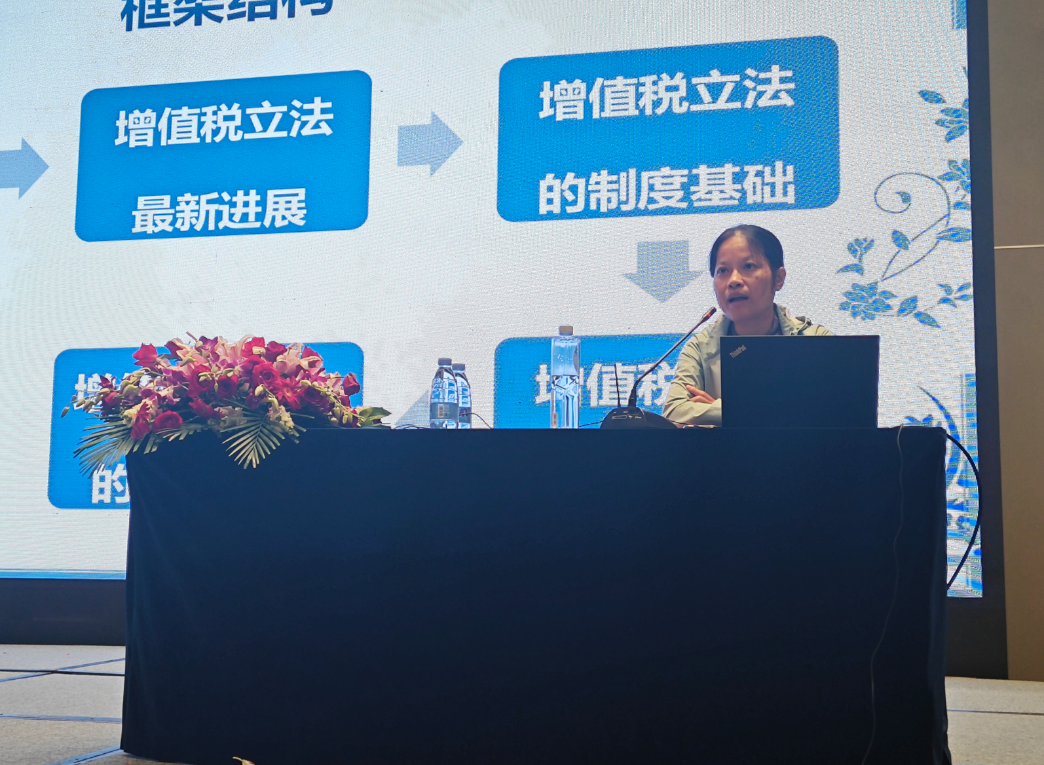
Pictured: professor yeh shan teaches
From 15: 00 p.m. to 16: 30 p.m. on August 14, Professor Ye Shan, a professor of Peking University Law School and director of Peking University Center for Research on Financial and Tax Law, gave a special lecture on the theme of "The Latest Development of VAT Legislation and Analysis of Key Issues". The lecture first reviews the historical process of value-added tax legislation, from the introduction and initial stage to the tax system perfection stage, and introduces the key reform measures in different stages in detail. Secondly, it introduces the legislative progress of the value-added tax law that everyone pays attention to, and focuses on analyzing the important nodes of value-added tax legislation in recent years. The lecture also discussed the key issues in value-added tax legislation, such as tax rate setting, tax incentives, small-scale taxpayer system, and analyzed the relevant policy background. In addition, it also discusses how the draft value-added tax law balances the principle of tax neutrality and fair taxation, and how to further improve the tax system and optimize the tax structure through legislation, so as to reserve space for economic development and new business model.
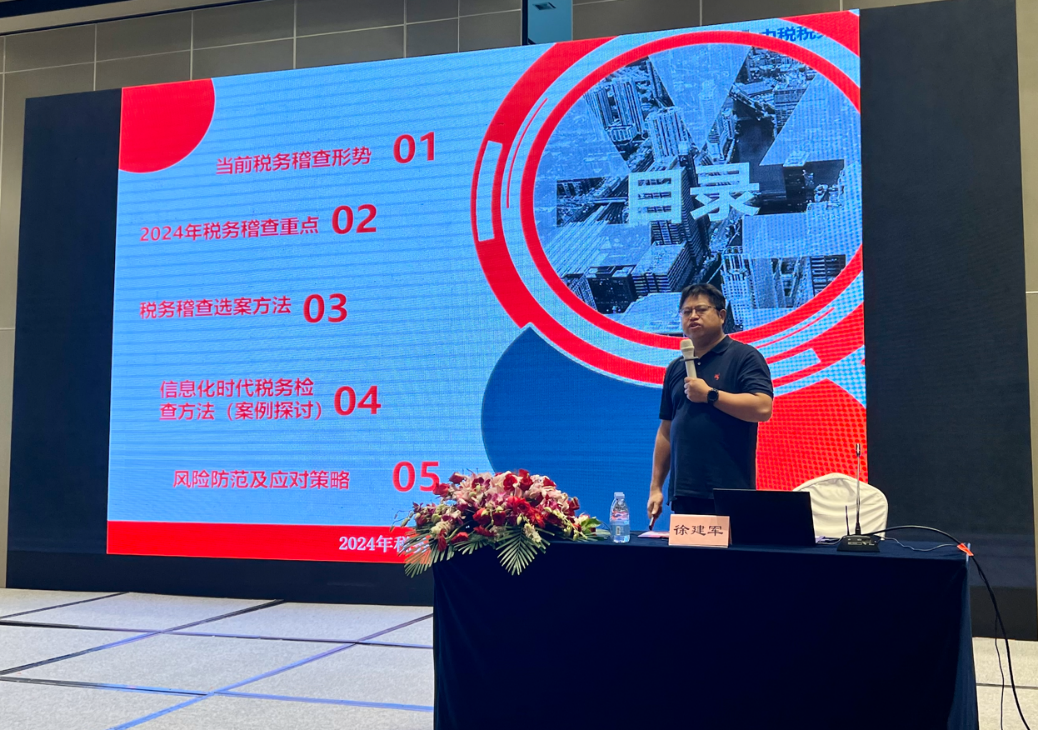
Pictured: Mr. Xu Jianjun gives lectures
From 9: 00 a.m. to 12: 00 a.m. on August 15, Mr. Xu Jianjun, former deputy director of the tax inspection bureau of a municipality directly under the central government and the first batch of national tax leaders in State Taxation Administration of The People's Republic of China, gave a special lecture on the theme of "2024 Tax Inspection Situation and Countermeasures". The lecture first introduces the current situation of tax inspection. Secondly, it introduces the key points of the tax inspection work in 2024, such as agriculture, human resources, medical care and other fields, strengthening the tax supervision of groups such as entertainment and network anchors, and strengthening the rectification of weak links in tax collection and management, such as tax collection and management of partnership enterprises, approved collection of individual partnership enterprises, natural person agency, etc., and increasing the compliance review of tax incentives such as deduction of research and development fees. Then, it introduces the tax inspection case selection methods, including reporting, transfer from other tax departments, transfer from other external units, supervision assigned by higher authorities, independent case selection by inspection departments, random spot checks and other ways and spot check proportion, and introduces how the tax authorities work through information-based inspection in the era of big data. In the end, it explains how to prevent tax risks and how to deal with tax risks.
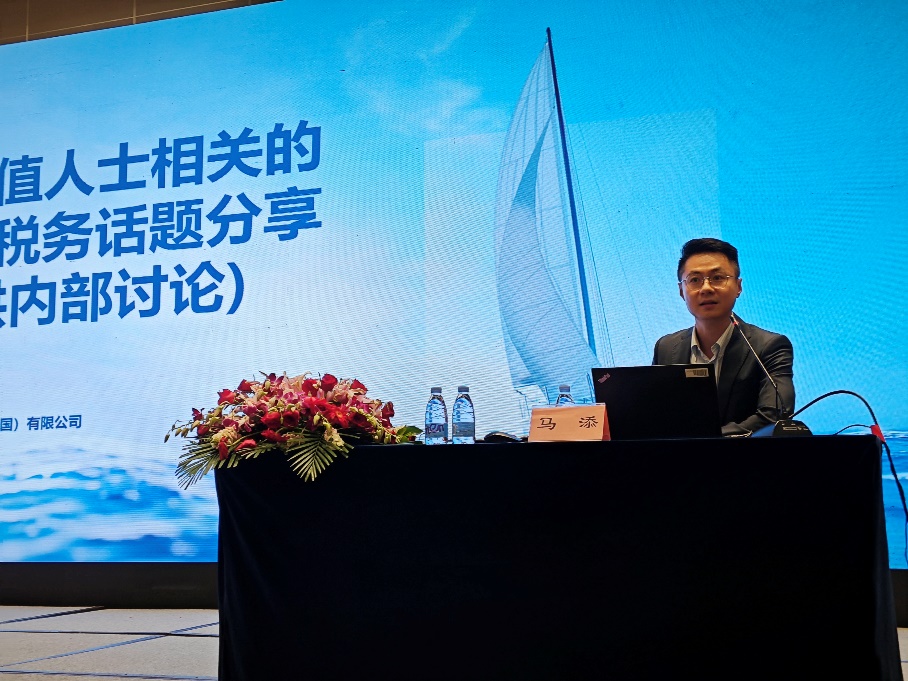
Pictured: Mr. Martin gives lectures
From 13: 30 p.m. to 16: 30 p.m. on August 15, Mr. Martin, a partner in KPMG's tax department, gave a special lecture on the topic of "sharing hot tax topics related to high net worth individuals". The lecture first introduces the latest development of tax and foreign exchange management in China, including but not limited to the strengthening of tax supervision, the improvement of the regulatory system, the deepening of tax administration by digital means, the optimization of tax collection model, the strengthening of international cooperation and the guidance of taxpayers to comply with the tax law. Secondly, it introduces the optimization ideas of high-net-worth individuals' taxation, including the establishment of domestic and overseas listing structure and the optimization ideas of individual taxation, the influence and planning of individual taxation resident status, the tax influence and planning of high-net-worth individuals under the new Company Law, etc. In the end, the thesis introduces the content of family business inheritance and planning, and focuses on the content of overseas family trust, including the introduction of family offices in Hong Kong, Singapore and other places and the main tax considerations.

Pictured: Summer Academy site
On the evening of August 15, from 18: 00 to 20: 00, a special salon was held on "Sharing of Agency Practice in Difficult Tax-related Disputes". The salon was presided over by zhangqian, a partner of Hwuason Law Frim. All the students of Summer Academy were divided into seven groups. Each group elected representatives of the students to share their experience in handling tax cases. The participants had a warm and in-depth discussion on the tax law issues of affiliation relationship, enterprises accepting falsely issued special invoices for value-added tax, transfer of natural person's equity, tax-related issues in enterprise restructuring and reorganization, preferential local tax policies and other issues. Lawyers from zhangqian made a brief comment on the participants' sharing, and the atmosphere at the scene was lively.
From 9: 00 a.m. to 10: 30 a.m. on August 16, a cadre from the Law Department of the General Administration of Customs gave a special lecture on "Understanding and Application of the New Customs Tax Law". The lecture gives a comprehensive and in-depth interpretation of the "Customs Law" enacted this time from four aspects: customs duties, the background of the customs legislation, the main contents of the customs law and other issues of the customs legislation. Customs duties are related to national sovereignty and interests, and are an important source of fiscal revenue. They have the characteristics of complex tax items and strong technology. Therefore, in the process of tariff legislation, the above-mentioned characteristics should be fully taken into account, and international high-standard economic and trade rules should be actively contacted, so as to absorb the experience of the current reform of the customs department and fully serve the development of high quality. On the basis of keeping the current tariff system basically stable and the tax burden level generally unchanged, the Customs Law further implements the statutory principle of taxation, strengthens the protection of taxpayers' rights, facilitates the customs clearance of taxpayers' goods, and strengthens the inspection obligation of the customs department, which is of great significance.
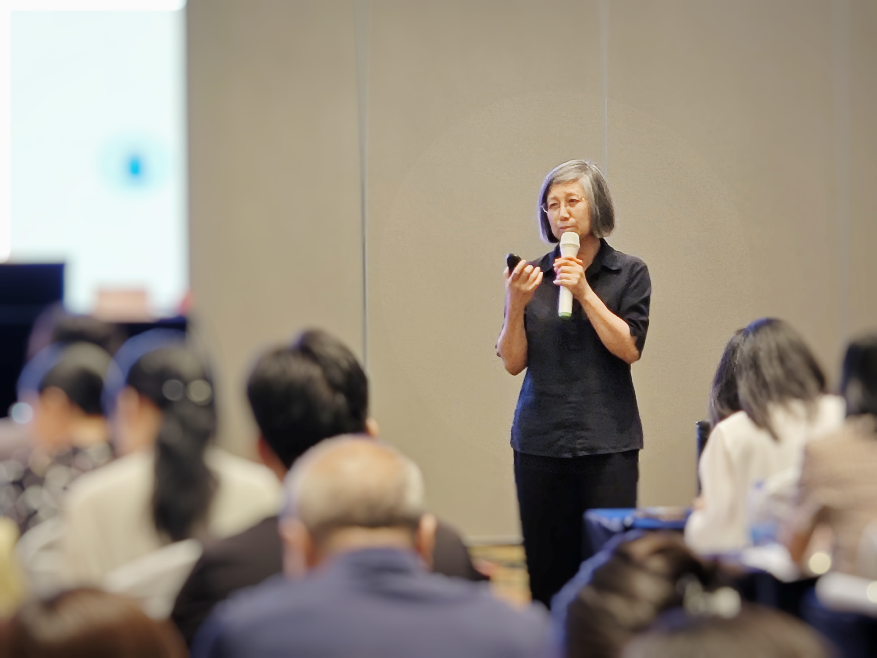
Pictured: Professor Liu Yi
From 10: 30 a.m. to 12: 00 a.m. on August 16, Professor Liu Yi, dean of the finance department of Peking University Institute of Economics and vice chairman of China Certified Tax Accountants Association, gave a special lecture on the theme of "Sharing Principles among Tax Regions and Reform of Fiscal and Tax Systems". The course first introduces the current industrial structure, tax structure and economic growth in China. The industrial structure of China's economy is constantly being optimized, and the proportion of service industry in GDP continues to rise. In order to meet the needs of economic development, the tax structure is also being adjusted. For example, the consumption tax collection phase is gradually moving backward, and plans to transfer it to local areas, which will help to expand local sources of income and improve the consumption environment. Secondly, it introduces the current practice of fiscal and tax competition and the imbalance of regional development, especially the adoption of the principle of "place of production" in the sharing of value-added tax among regions, which encourages the local government to pay more attention to attracting investment rather than stimulating local consumption, resulting in the imbalance of regional economic development. Finally, the course introduces the principle of tax sharing and the solutions to the effective supply of local public goods, which can better promote the local government to change its development thinking and encourage consumption-driven economic growth, so as to provide local public goods and services more effectively.
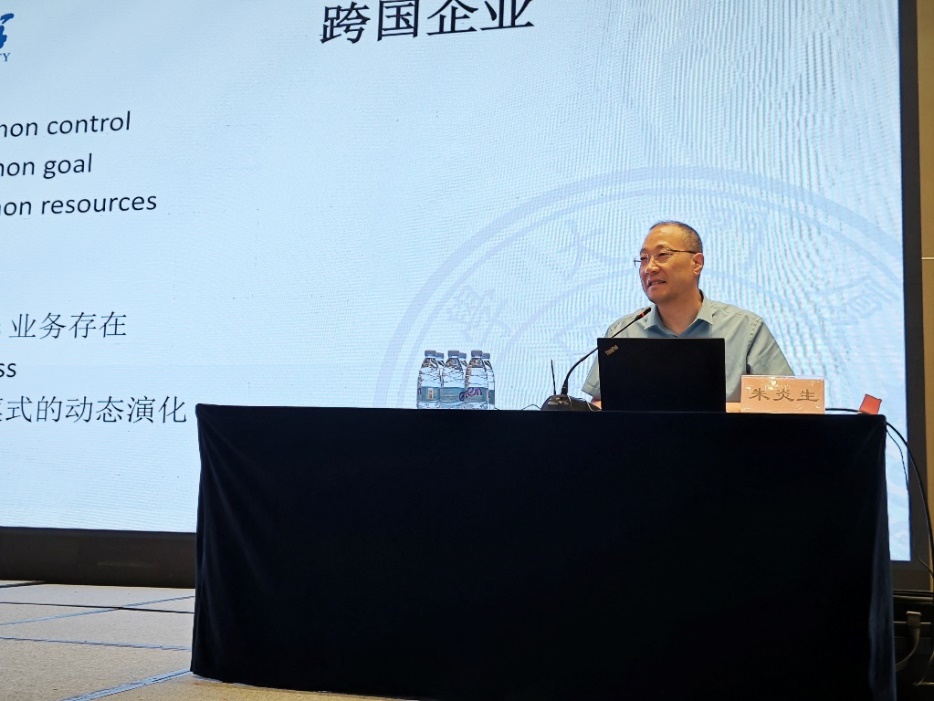
Pictured: Professor Zhu Yansheng gives lectures
From 13: 30 p.m. to 16: 30 p.m. on August 16, Professor Zhu Yansheng, professor of Xiamen University Law School and director of the China -OECD Joint Training Master of Laws in Tax, gave a special lecture on the topic of "Hot Practice in Cross-border Investment and Financing under the New International Tax Pattern". First of all, the lecture gives an overview of the characteristics of multinational enterprises, then introduces different types of enterprise structures, such as parent company and subsidiary company, head company and subsidiary company, cooperation structure, etc., and discusses the considerations of these structures in terms of legal responsibility, risk control, financial management, tax treatment, etc. Secondly, it focuses on the specific measures of OECD and the Action Plan to Prevent Tax Base Erosion and Profit Shifting (BEPS). Then, it introduces the evolution of management model of multinational companies, digital business model, business distribution of multinational companies, etc. Finally, the tax-related arrangements for cross-border investment and financing of enterprises are introduced, and valuable suggestions are provided for enterprises to formulate effective tax strategies under the background of globalization and digitalization.
From 9: 00 a.m. to 12: 00 a.m. on August 17, a senior criminal judge of a court gave a special lecture on "Two Supreme" on the topic of "Understanding and Application of Judicial Interpretation of Crimes against Tax Administration". The lecture is mainly divided into three parts. The first part is the background of judicial interpretation. Before this, "Two Supreme" has successively formulated three judicial interpretations for crimes endangering tax collection and administration, which have played an important role in guiding the national courts in the trial. However, due to the long time of formulation, it is necessary to re-enact the judicial interpretation. The second part is the drafting ideas and principles. The drafting of the judicial interpretation insists on taking Xi Jinping Thought on Socialism with Chinese Characteristics for a New Era as the guidance, thoroughly implementing Xi Jinping's thought of the rule of law and Xi Jinping's economic thought, based on solving the outstanding problems in the application of laws, and taking into account the needs of criminal justice and tax administration law enforcement, etc. The third part is about the main content of the explanation. There are 22 interpretations, which mainly include 5 aspects. Next, he focused on the crime of tax evasion, defrauding export tax rebates, falsely making out special invoices for value-added tax, and made an in-depth explanation and analysis.
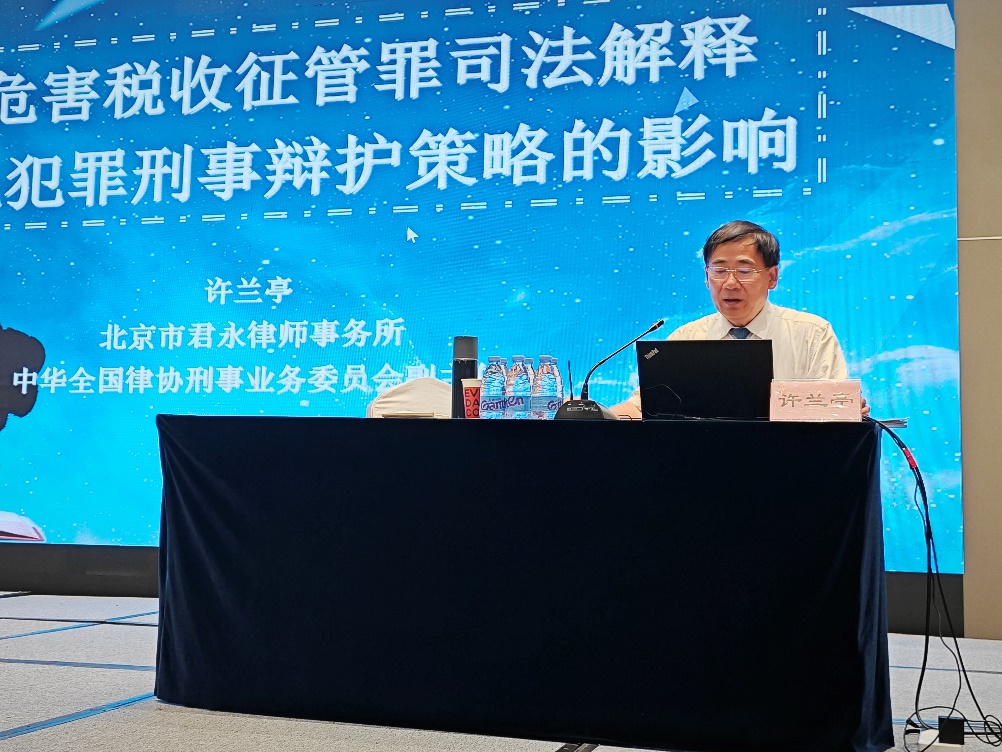
Pictured: Director Xu Lanting gives lectures
From 13: 30 p.m. to 15: 00 p.m. on August 17, Mr. Xu Lanting, deputy director of the Criminal Committee of the National Lawyers Association and honorary director of Beijing Junyong Law Firm, gave a special lecture on the topic "Two Supreme" the influence of the judicial interpretation of the crime of endangering tax collection and administration on the criminal defense strategies of tax-related crimes ". The course is divided into two parts. The first part explains the "Two Supreme" judicial interpretation of the crime of endangering tax collection and administration. He introduced the definition of the crime of falsely making out special invoices for value-added tax, and pointed out that if the actor's purpose was not to defraud the tax deduction and there was no tax loss as a result, it would not constitute this crime. At the same time, it introduces the difference between the crime of falsely issuing special invoices for value-added tax and other tax-related crimes, such as the boundary between the crime of falsely issuing special invoices for value-added tax and the crime of tax evasion, the crime of illegally selling special invoices for value-added tax, and the practical application of the theory of joint crime in defining what constitutes a crime. In the second part, he gave lectures on "criminal defense methods and techniques" and summarized the defense techniques from ten aspects: mastering substantive law, mastering procedural law and being familiar with evidence law.
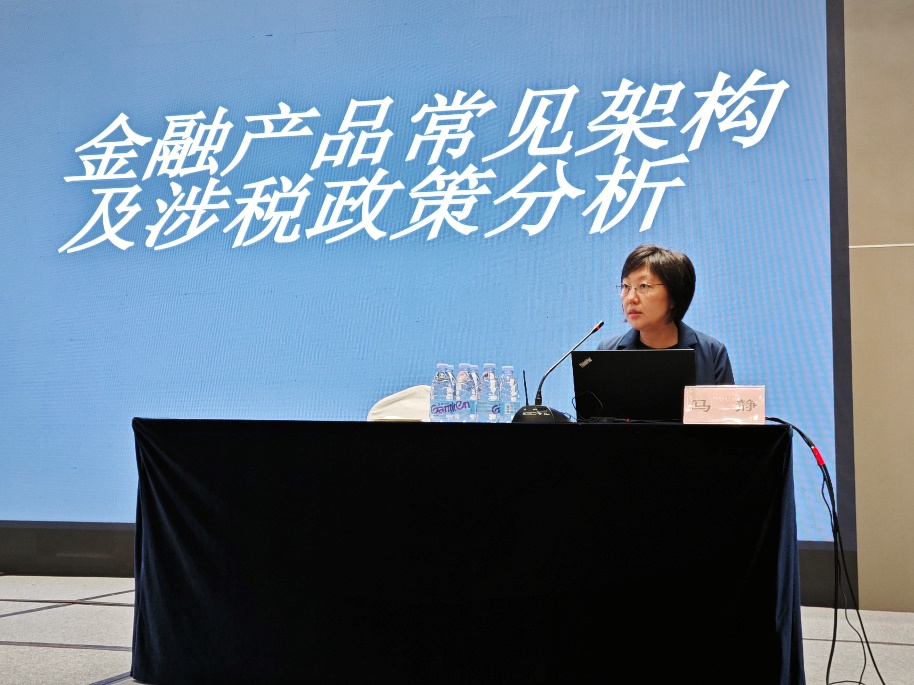
Pictured: Ms. Ma Jing gives lectures
From 15: 00 to 16: 30 p.m. on August 17, Ms. Ma Jing, a tax partner of PricewaterhouseCoopers, gave a special lecture on "Financial and Tax Policies and Difficult Practices". The course begins with an introduction to the common structure of financial products and tax-related policies. The options for foreign investors to directly invest in China include securities, private equity and private equity. In the lecture, the structure of the above financial products and the tax considerations of the structure were introduced respectively, including the status of China tax residents at the fund level, the management fee and the tax treatment of excess income, etc. Secondly, the course further discusses the tax policy and practical issues of asset management products. The range of asset management products is very wide, including banking wealth management products, trust products, Public Offering of Fund, etc. The course details the tax treatment of these products at different stages of investment. In addition, a tax-related judgment decision tree is provided to help understand the tax treatment methods for different types of investment income.
August 18, 9:00-10:30 a.m. Lawyer Wang Qiang, a partner of Hwuason Law Frim, gave a special lecture on the topic of "Analysis of the provisions of the crime of falsely issuing special invoices for value-added tax and case sharing". The lecture first analyzes the relevant legal provisions and judicial interpretations of the crime of falsely issuing special invoices for value-added tax, and then takes a typical case to make an in-depth analysis of the crime of falsely issuing special invoices for value-added tax, and introduces the business model involved in the case and the logic of public security in determining the crime of falsely issuing special invoices. Finally, the author shared his thoughts on handling the case.
From 10: 30 a.m. to 12: 00 a.m. on August 18, Cheang Cheng, a partner of Hwuason Law Frim, and his lawyer gave a special lecture on the topic of "Two Supreme" Judicial Interpretation of Provisions and Case Analysis on Fraud of Export Tax Rebates. The course introduces the understanding of the provisions of the crime of defrauding export tax rebates, the significant changes in the provisions of the criminal law extending to the crime of defrauding export tax rebates, the judicial interpretation of the crime of tax fraud in "Two Supreme", and the controversial issues in the interpretation of "Two Supreme". At last, it discusses the criminal compliance of tax-related crimes.
On August 18, from 13: 30 p.m. to 17: 00 p.m., the "First High-level Forum on Professional Innovation and Development of Tax Lawyers in China (2024)" was held. With the theme of "professional development and innovation of tax lawyers", the forum invited well-known experts and scholars, representatives of the finance and taxation committees of some provincial and municipal lawyers' associations, tax lawyers and others to gather in Beijing to bring together innovative forces and discuss development plans. The forum was presided over by Mr. Liu Guiming, the executive director of the editorial board of China Democracy and Law Publishing House, the vice-chairman of china law society Law document science Research Association and the dean of Guangxi Guest College. The forum was divided into two parts. The first segment was a guest speech, which was given by Professor Shi Zhengwen, vice-chairman of the china law society Institute of Finance and Taxation Law and director of the Institute of Finance and Taxation Law of China University of Political Science and Law; Professor Teng Xiangzhi, research fellow of the Institute of Finance and Economics Strategy of the China Academy of Social Sciences and director of the Case Study Center of Finance and Taxation Law of the China Academy of Social Sciences; and Director of the Professional Committee of Finance and Taxation Law of the National Lawyers Association and Director Liu Tianyong, director of the Hwuason Law Frim, focusing on issues such as the reform of the rule of law in finance and taxation The second session was a keynote speech, in which representatives from the finance and taxation committees, tax lawyers and tax agents of the law associations of Beijing, Shanghai, Hangzhou, Jiangsu, Shandong, Shenzhen, Yunnan, Guangdong and other provinces and cities shared their own opinions and views on issues such as creating "professional and refined" advantages in tax-related legal services, expanding the business of tax lawyers and cooperation among tax-related professional service agencies. In the process of the forum, the guests interacted with the participants frequently and the atmosphere was very warm.
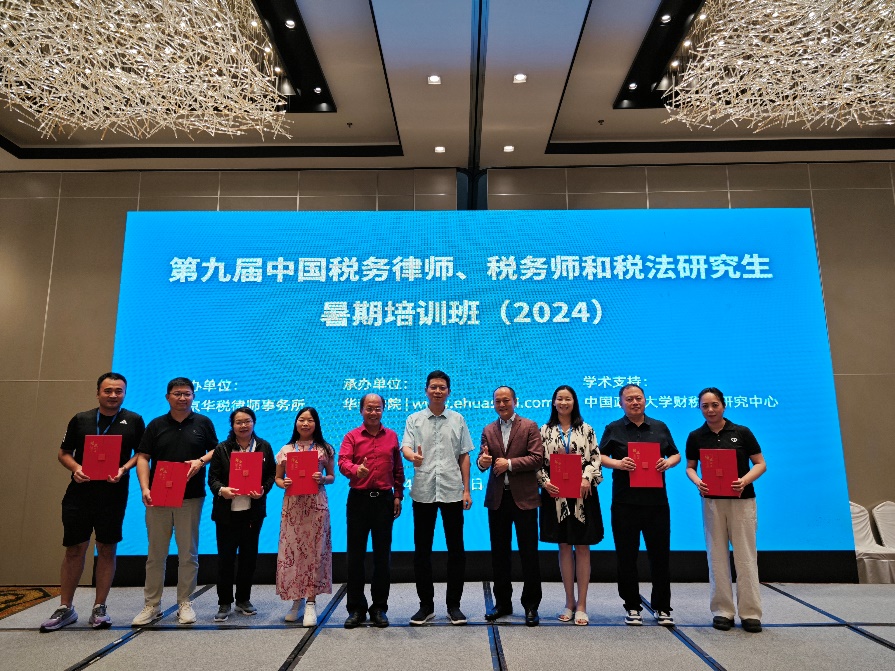
Pictured: issuance of certificate of completion
August 18, 17:00-17:30 p.m., "The 9th China Tax Lawyers, The "special training course on judicial affairs related to tax by the supreme court and procuratorate" was successfully concluded and a graduation ceremony was held. The graduation ceremony was presided over by Mr. Liu Tianyong, Director of the Financial and Tax Law Committee of all china lawyers association and Director of the Hwuason Law Frim.
Professor Shi Zhengwen, vice-chairman of the china law society Institute of Finance and Tax Law and director of the Institute of Finance and Tax Law of China University of Political Science and Law, delivered a graduation speech. He expressed his heartfelt gratitude to the organizers of the Summer Academy and congratulations to all the students who successfully graduated. He believed that the Summer Academy has a strong teaching staff and the training content plays an important role in improving the overall business level of our tax lawyers and tax agents. He wished all the students become high-level tax law experts and wished the Summer Academy a better and better performance.
Director Liu Tianyong, on behalf of Hwuason, the organizer of this summer college, extended warm congratulations to the students who successfully graduated this year, and expressed his heartfelt thanks to all the leaders and experts who have worked hard to teach! And I wish you all greater success!
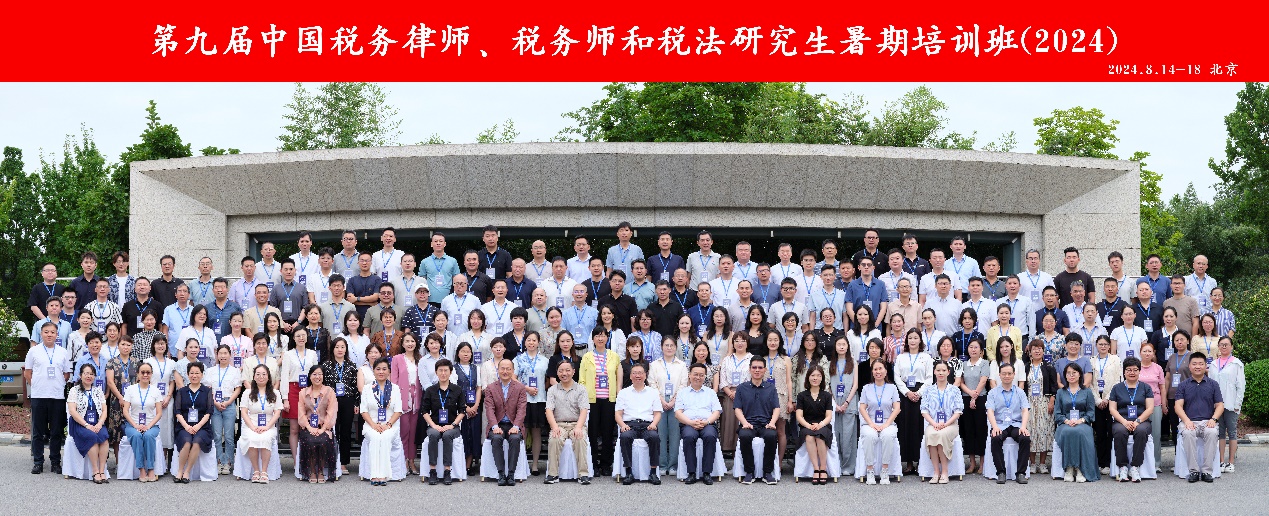
Pictured: a group photo
Since its launch in 2014, the "Summer Academy for Tax Lawyers, Tax Agents and Graduate Students in Tax Law of China" has been successfully held for nine times. Its social influence is growing day by day and it has become an important platform for training tax-related professional service personnel in China. Under the background of studying and implementing the Party's "The Spirit of the Third Plenty Session of the 20th Central Committee", after five days of intensive study and exchange, the students not only deepened their understanding of the tax policy, but also gained new perspectives and new methods to deal with complex cases. The Summer Academy has sent about 200 compound professionals with "tax+law+industry" to various sectors of the society, which will promote the modernization process of the tax law system in various regions and contribute more to the prosperity of the tax lawyer and tax agent industry in China.
In response to the enthusiastic demand from the majority of participants, the organizing committee has specially opened a QR code reservation channel for the 2025 summer training program. Admission spots are limited and will be allocated on a first-come, first-served basis. We look forward to seeing you again next year!






